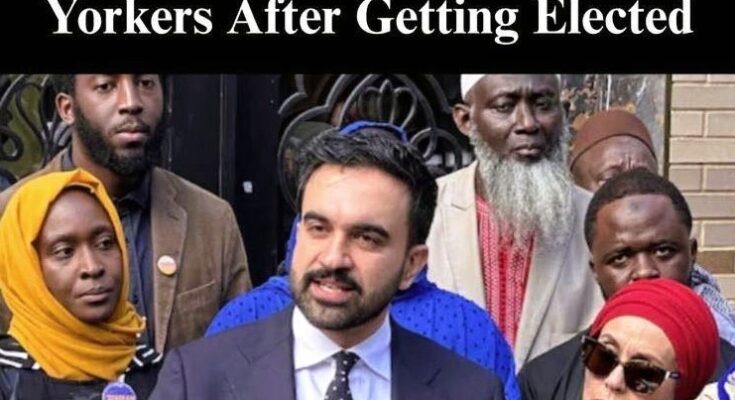NEW YORK CITY — Less than a day after winning one of the most hard-fought mayoral elections in New York’s recent history, Zohran Mamdani is already facing sharp criticism — not for a policy decision, but for a request.
In a video posted to X (formerly Twitter) late Tuesday night, the newly elected mayor thanked supporters for helping him secure a decisive victory over former Governor Andrew Cuomo and Republican candidate Curtis Sliwa, before asking for something unexpected: donations from working-class New Yorkers to fund his transition into office.
The video, just under two minutes long, struck a tone of both gratitude and urgency. Standing in front of a campaign banner that read “New York for All of Us,” Mamdani thanked voters for “making history” and said the work of building a fairer, more affordable city had “only just begun.”
“The campaign is over,” Mamdani said. “But the fight to deliver real change is just beginning. We need resources to build a transition team that reflects the people — to hire policy experts, strengthen our infrastructure, and make sure we start this administration on solid ground.”
The message was part of what his campaign described as a “people-powered transition fund” — a voluntary fundraising effort designed to ensure that his incoming administration could hire independent policy specialists rather than rely on establishment donors or corporate lobbyists.
But despite the explanation, the response online was swift and polarized.
Backlash Builds Online
Within hours, Mamdani’s video had been viewed hundreds of thousands of times and had sparked a wave of criticism across social media. Many users accused the mayor-elect of hypocrisy, arguing that it was inappropriate for someone who had spent months promising “free transit,” “rent freezes,” and “a city that works for everyone” to now ask for more money — particularly from working-class New Yorkers.
“It’s been less than 24 hours since Mamdani won and he’s already asking for money,” one user posted. “Congratulations, New York City. You just bought yourself another politician with expensive promises.”
Another wrote, “He campaigned on ‘free’ everything — now he’s begging for donations. What a start.”
Critics on both sides of the political spectrum piled on. Some conservatives framed Mamdani’s appeal as proof that his policies were “financially unrealistic,” while centrist Democrats questioned the optics of asking for money so soon after an election centered around economic hardship.
“Even if his intentions are good, the timing is terrible,” said Luis Montoya, a Democratic strategist in Brooklyn. “You can’t campaign as a champion of the poor one day and ask those same people to donate the next. It looks tone-deaf, even if the cause is legitimate.”
Supporters Defend the Move
Mamdani’s allies, however, insist that the backlash is overblown — and that the mayor-elect is simply staying true to his grassroots approach.
“What he’s doing is transparent and democratic,” said Aisha Rahman, a volunteer who worked on Mamdani’s campaign. “He’s refusing corporate transition funding. He’s asking the people who elected him to help him build an administration free from special interests. That’s exactly what we said we wanted.”
Others noted that transition fundraising is a common practice among elected officials, including governors and mayors across the country. Unlike campaign donations, which are heavily regulated by election law, transition funds are typically used to cover staffing, research, and planning costs between Election Day and Inauguration Day.
“The outrage is more about perception than reality,” said Dr. Henry Calloway, a political science professor at Hunter College. “Transition funds are normal. The controversy here stems from the fact that Mamdani positioned himself as an anti-establishment figure. So when he asks for donations, it feels contradictory to that image.”
Still, Calloway acknowledged that the optics matter — especially in a city where affordability, inequality, and housing costs dominated the campaign conversation.
A Campaign Built on Economic Promises
Mamdani, 33, ran an unapologetically progressive campaign centered around economic justice. He vowed to make public transportation free, freeze residential rents citywide, and raise taxes on the wealthiest New Yorkers to fund expanded public services.
Those proposals made him a hero to younger, working-class voters who felt ignored by the political establishment — and a target for critics who said his plans were unrealistic or economically dangerous.
During the campaign, Mamdani frequently told supporters not to donate beyond small, grassroots contributions, emphasizing that his campaign was “for working people, not the wealthy elite.”
That message resonated deeply in neighborhoods like the Bronx, Jackson Heights, and parts of Brooklyn, where residents turned out in large numbers to support his vision of a “just and livable” New York.
But the same populist tone that fueled his rise now appears to be feeding the backlash to his post-election request.
“He said billionaires would pay for everything,” said Anthony Ruiz, a small business owner from Queens. “Now he’s asking the people who ride the subway to pay for his staff. That doesn’t sit right.”
From Campaign to Governance
The incident highlights a broader challenge Mamdani will face as he transitions from activist candidate to governing mayor: balancing big ideals with the practical realities of running a city of 8.5 million people.
In his video, Mamdani acknowledged that the transition period would require tough decisions and careful planning. He promised to assemble a diverse team of advisors and policy experts to “chart the course toward a more equitable New York.”
He also reiterated that his administration would remain “free from corporate influence,” saying, “Our independence is our strength. We will not compromise our values for donations from the powerful.”
Whether the message reassures skeptical voters remains to be seen.
Public Reaction: Divided but Watching Closely
Public reaction remains sharply divided. While some supporters praised Mamdani for his transparency and refusal to seek private funding, others viewed the move as an early sign of overreach or poor judgment.
“He’s showing his hand,” said Tanya Lowell, a Manhattan political commentator. “He’s a movement politician, not a manager. The first test of his leadership will be whether he can turn his activist energy into effective governance.”
Others struck a more forgiving tone.
“At least he’s being honest about needing resources,” said Peter Gibbons, a lifelong New Yorker from Staten Island. “Every mayor needs money to start. The difference is that he’s asking out in the open, not taking backroom checks.”
The Road Ahead
As Mamdani prepares to take office in January, the fundraising controversy underscores the fine line he’ll need to walk between idealism and pragmatism.
If his transition succeeds, it could mark the start of a new model of grassroots governance in one of the world’s most complex cities. If it falters, critics say, it will reinforce their warnings that Mamdani’s vision for New York — however inspiring — may be easier to campaign on than to actually deliver.
For now, the mayor-elect appears undeterred.
“We made history together,” Mamdani wrote in his post. “Now it’s time to build the future — together.”

